President Tsai Ing-wen (蔡英文) yesterday expressed her willingness to hold “meaningful dialogue” with Beijing so that peace and stability can be maintained across the Taiwan Strait.
“At this stage, the most pressing cross-strait issue is to discuss how we can live in peace and coexist based on mutual respect, goodwill and understanding,” Tsai told Double Ten National Day participants.
“As long as the Beijing authorities are willing to resolve antagonisms and improve cross-strait relations, while parity and dignity are maintained, we are willing to work together to facilitate meaningful dialogue,” she said.
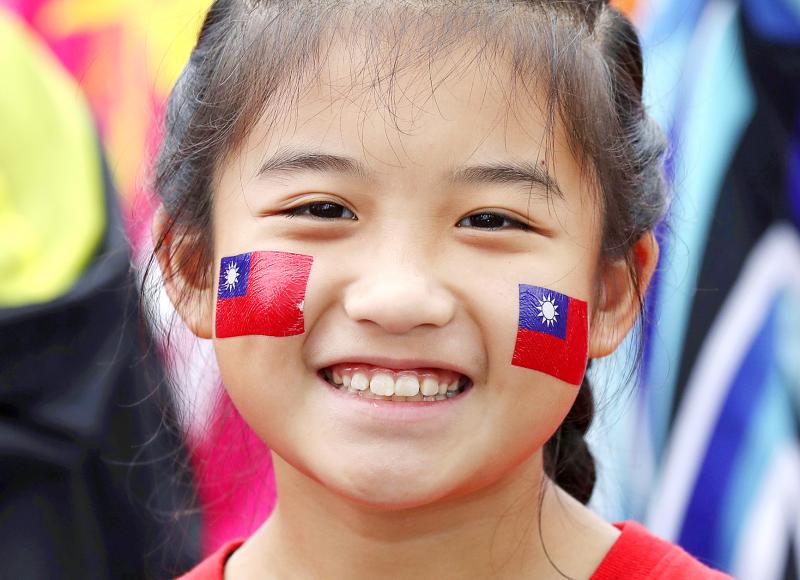
Photo: Chiang Ying-ying, AP
Tsai’s statement follows a further deterioration of already sour cross-strait relations as Taiwan and the US have shown closer engagement, such as high-level visits by US officials and more arms sales to Taiwan.
Beijing has responded by conducting more military exercises near Taiwan, including flying its warplanes into Taiwan’s air defense identification zone.
Tsai said that maintaining adequate defense capabilities is the only way for Taiwan to guarantee national security and regional peace.
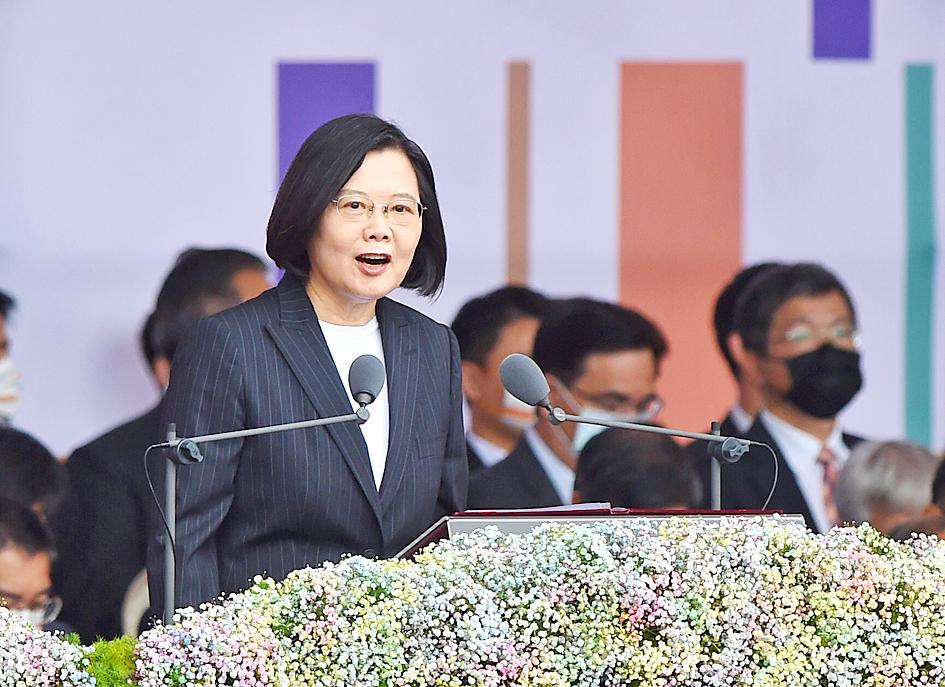
Photo: Liu Hsin-de, Taipei Times
“We will continue to modernize defensive combat capabilities and accelerate the upgrading of our asymmetrical capabilities to deal with military expansion and provocation from the other side of the Taiwan Strait,” she said.
Tsai said that Taiwan would continue to neither fear nor seek war to avoid potential conflicts due to miscalculations, saying that maintaining stability is in the best interests of both sides of the Strait.
“We are committed to upholding cross-strait stability, but this is not something Taiwan can shoulder alone,” she said. “It is the joint responsibility of both sides.”

Photo: Fang Pin-chao, Taipei Times
Tsai expressed the hope that China would genuinely change, saying that Chinese President Xi Jinping (習近平) pledged at last month’s UN General Assembly that Beijing would never seek hegemony or expansion.
Tsai also said that her administration would pursue three major strategies to boost the local economy, as Taiwan has done better than many other countries at fighting COVID-19.
“Because the pandemic was properly controlled, Taiwan became one of the few countries in the world that maintained positive economic growth,” Tsai said.
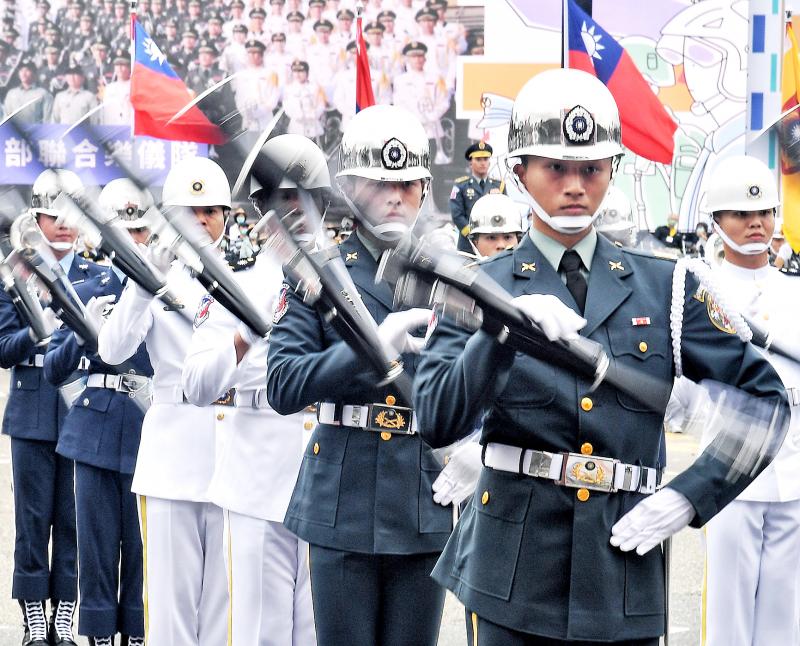
Photo: CNA
“We have also prepared for economic development in the post-pandemic era,” she said, referring to six core strategic industries that she announced earlier this year: the Internet of Things, artificial intelligence, information security, biotech applications, national defense and renewable energy development.
Tsai said that the government would continue to advance the Forward-looking Infrastructure Development Program, which covers rail transport construction, water improvement, digital development, urban and rural development, improvement of childcare environments and enhanced food safety.
At a time when global supply chains are being restructured, Taiwan would fully participate in reorganizing them, Tsai said.
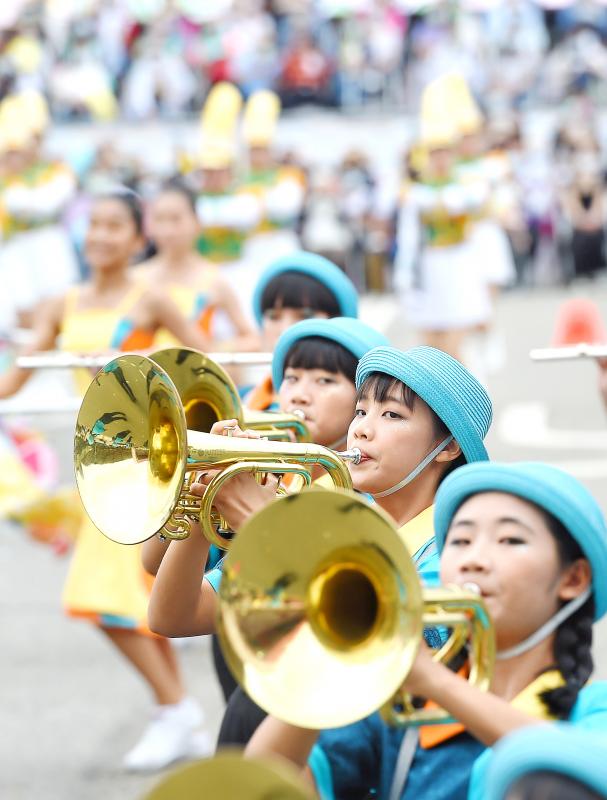
Photo: Fang Pin-chao, Taipei Times
“The rapid dismantling and realignment of global supply chains is now irreversible, and Taiwanese businesses around the world are moving toward segmented markets, production base migration and reshoring to invest in Taiwan at an ever-faster pace,” Tsai said.
“We will link all of these related policies and programs, while integrating government and private sector resources with cross-department capabilities to achieve full and comprehensive participation in the realignment process, making Taiwan an indispensable force in global supply chains,” she added.
The nation would transform itself into a hub for international capital, talent and digital technology, Tsai said, adding that investing effort into this upgrade is needed before Taiwan can help reorganize the global supply chain.
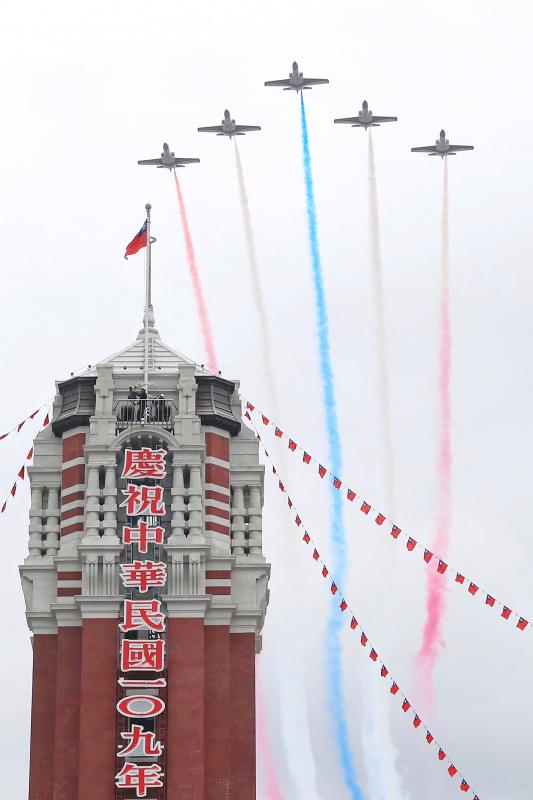
Photo: CNA
The government would do its best to balance economic and social development, handling risks resulting from unbalanced development and repercussions likely to rise from massive increases in capital supply, she said.
Tsai touted the government’s achievements at international economic cooperation, citing last week’s signing of a framework with the US to strengthen infrastructure finance and market-building cooperation.
Under the agreement, Taiwan is expected to join the US in infrastructure projects in the Americas and the Indo-Pacific region, she said.
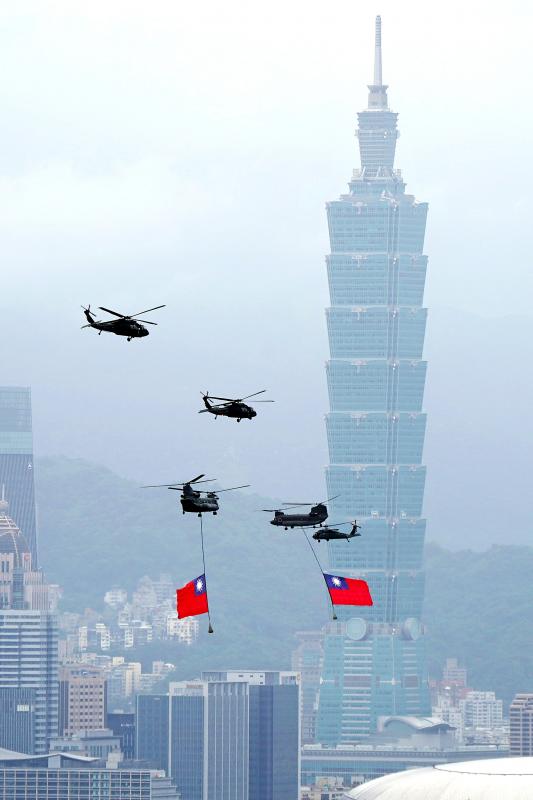
Photo: CNA
Taiwan and the US plan to hold high-level economic talks to identify opportunities for cooperating on the realignment of global supply chains, technology advancements and infrastructure development, among other areas, Tsai added.
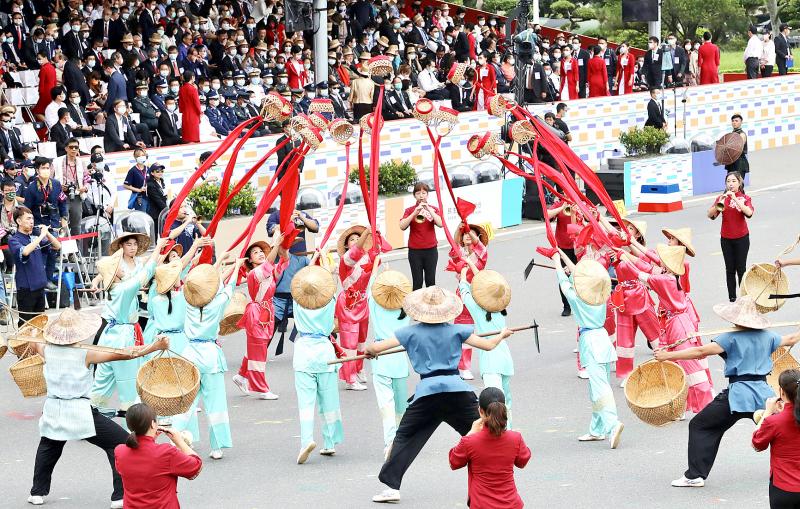
Photo: CNA
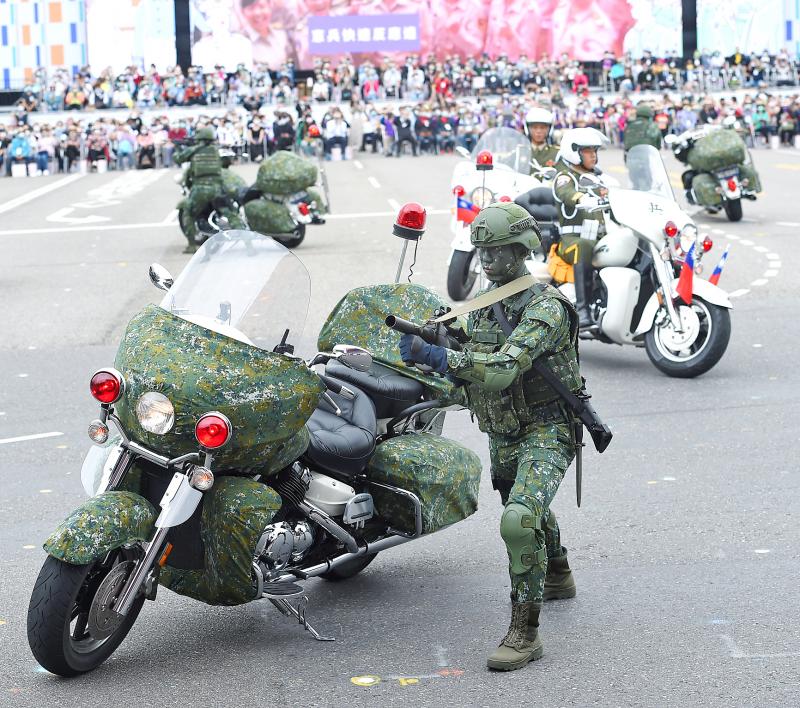
Photo: CNA
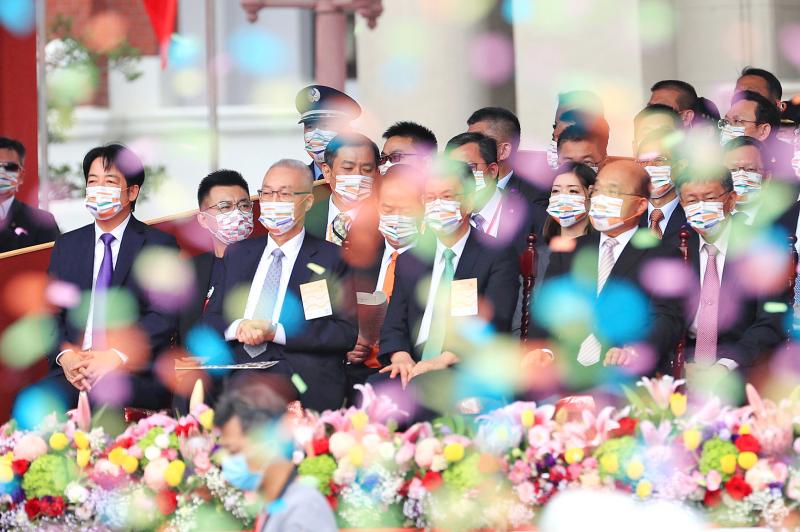
Photo: CNA

A magnitude 7.0 earthquake struck off Yilan at 11:05pm yesterday, the Central Weather Administration (CWA) said. The epicenter was located at sea, about 32.3km east of Yilan County Hall, at a depth of 72.8km, CWA data showed There were no immediate reports of damage. The intensity of the quake, which gauges the actual effect of a seismic event, measured 4 in Yilan County area on Taiwan’s seven-tier intensity scale, the data showed. It measured 4 in other parts of eastern, northern and central Taiwan as well as Tainan, and 3 in Kaohsiung and Pingtung County, and 2 in Lienchiang and Penghu counties and 1

A car bomb killed a senior Russian general in southern Moscow yesterday morning, the latest high-profile army figure to be blown up in a blast that came just hours after Russian and Ukrainian delegates held separate talks in Miami on a plan to end the war. Kyiv has not commented on the incident, but Russian investigators said they were probing whether the blast was “linked” to “Ukrainian special forces.” The attack was similar to other assassinations of generals and pro-war figures that have either been claimed, or are widely believed to have been orchestrated, by Ukraine. Russian Lieutenant General Fanil Sarvarov, 56, head

FOREIGN INTERFERENCE: Beijing would likely intensify public opinion warfare in next year’s local elections to prevent Lai from getting re-elected, the ‘Yomiuri Shimbun’ said Internal documents from a Chinese artificial intelligence (AI) company indicated that China has been using the technology to intervene in foreign elections, including propaganda targeting Taiwan’s local elections next year and presidential elections in 2028, a Japanese newspaper reported yesterday. The Institute of National Security of Vanderbilt University obtained nearly 400 pages of documents from GoLaxy, a company with ties to the Chinese government, and found evidence that it had apparently deployed sophisticated, AI-driven propaganda campaigns in Hong Kong and Taiwan to shape public opinion, the Yomiuri Shimbun reported. GoLaxy provides insights, situation analysis and public opinion-shaping technology by conducting network surveillance

‘POLITICAL GAME’: DPP lawmakers said the motion would not meet the legislative threshold needed, and accused the KMT and the TPP of trivializing the Constitution The Legislative Yuan yesterday approved a motion to initiate impeachment proceedings against President William Lai (賴清德), saying he had undermined Taiwan’s constitutional order and democracy. The motion was approved 61-50 by lawmakers from the main opposition Chinese Nationalist Party (KMT) and the smaller Taiwan People’s Party (TPP), who together hold a legislative majority. Under the motion, a roll call vote for impeachment would be held on May 19 next year, after various hearings are held and Lai is given the chance to defend himself. The move came after Lai on Monday last week did not promulgate an amendment passed by the legislature that